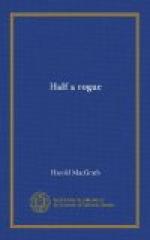In college the two lads were as inseparable as La Mole and Coconnas; they played on the same teams, rowed on the same crews and danced with the same girls. The only material difference in their respective talents lay in one thing: Bennington could not write a respectable rhyme, and I’m not sure that he wasn’t proud of it. It distinguished him from the other members of his class. As for Warrington, there wasn’t a pretty girl in the whole college town who couldn’t boast of one or more of his impassioned stanzas. And you may be sure that when Warrington became talked about these self-same halting verses were dug up from the garret and hung in sundry parlors.
Bennington was handsome, and, but for his father’s blood, the idleness of his forebears would have marked him with effeminateness. His head, his face, the shape of his hands and feet, these proclaimed the aristocrat. It was only in the eyes and the broad shoulders that you recognized the iron-monger’s breed. His eyes were as blue as his own hammered steel; but, like the eyes of the eagle at peace, they were mild and dreamy and deceptive to casual inspection. In the shops the men knew all about those eyes and shoulders. They had been fooled once, but only once. They had felt the iron in the velvet.
“I’m mighty glad to see you, boy,” said Warrington, dropping his arms. “You haven’t changed a bit.”
“Nor you, Dick; if anything you look younger.”
“How many years is it, John?”
“Six or seven; not very long.”
“Time never seems long to a man who never has to wait for anything. I have had to reckon time with hours full of suspense, and those hours have aged me; perhaps not outwardly, but all the same, I’m an old man, John.”
“Nonsense!”
“When did you cross?”
“About a year ago, when father died. I had given up the English end of the concern two years before, and was just wandering about the continent. I was dreadfully disappointed when I learned that you had visited the shops in ninety-eight. That summer I was in Switzerland. I had no idea there was going to be war, and never saw a newspaper till it was nearly over. I should have enlisted. And another year we passed within two days of each other.”




